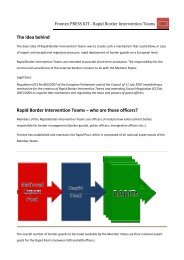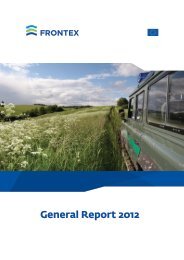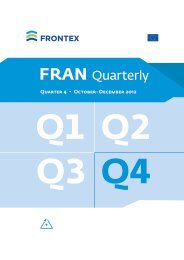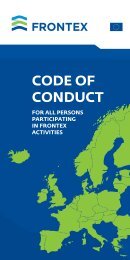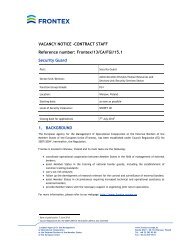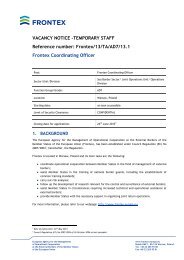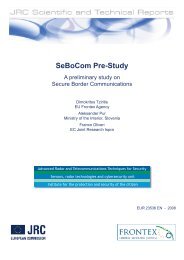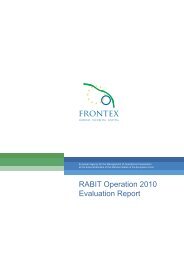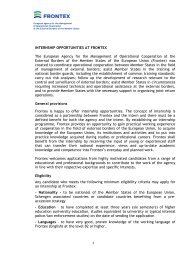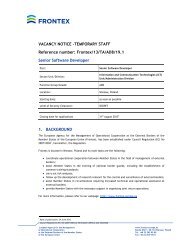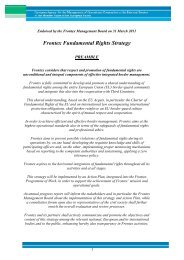Download PDF - Frontex
Download PDF - Frontex
Download PDF - Frontex
Create successful ePaper yourself
Turn your PDF publications into a flip-book with our unique Google optimized e-Paper software.
Member States have expressed a need to have continued discussions on practical problems<br />
arising at the external borders, as well as on the introduction of new equipment/systems. In<br />
order to cater for this need, <strong>Frontex</strong> will provide the platform and facilitate the development<br />
of common practices and guidelines.<br />
The following projects are planned to run under this Programme in 2013:<br />
ID check<br />
EUR 620.000<br />
The project focuses on technology and methods for the detection of document and identity<br />
fraud and deceptive behaviour at border crossing points (BCPs). The aim is to help border<br />
guards in the first line to take informed decisions in application of the entry criteria spelled<br />
out in the Schengen Border Code: verification of the authenticity of documents, verification of<br />
the identity of the document holder and of the purpose of travel, and the assessment of the<br />
individual risk level of until then unknown potential threats. Activities will focus on innovation<br />
in counterfeited/false documents detection (including the verification of electronic passports),<br />
biometrics, and physio-behavioral analysis.<br />
Advanced Risk Management<br />
Budget: EUR 200.000<br />
The activities conducted by <strong>Frontex</strong> during 2011-2012 on Advance Passenger Information (API)<br />
have revealed that MS have many needs that cannot be fulfilled because of limitations and<br />
ambiguities in the current API Directive. The consequences have been a limited roll out of such<br />
systems, and a large degree of divergence between existing ones. This is currently the cause of<br />
problems and inefficiencies, both for carriers operating into the EU and border management<br />
authorities of MS.<br />
The regulatory framework around API and PNR is about to undergo relevant changes. On one<br />
hand there is a proposal for a PNR Directive being debated in Parliament, and on the other<br />
hand there are plans for revisiting the existing API Directive. This poses a unique opportunity in<br />
a limited time window for elevating to the Commission, Parliament and Council the challenges<br />
and areas for improvement identified by end-users.<br />
The main goal for 2013 is thus to gather MS needs regarding API, and disseminate them to key<br />
stakeholders. The focus will be eminently practical, addressing the specific problems reported<br />
by MS, and ensuring that any new/revised regulatory framework supports harmonized<br />
implementations.<br />
Also in 2013 the project will continue helping MS to deploy API systems and achieving greater<br />
harmonisation levels, e.g. by providing best practices.<br />
Another important goal for the activities in 2013 will be the development of a concept for<br />
transition from current forms of Advance Information to Advanced Risk Management (ARM)<br />
Automated Border Control (ABC) 2013<br />
Budget: EUR85.000<br />
The ABC project 2012 focused on continued development of best practice guidelines, validation<br />
and dissemination work, as well as the development of capability tools for member states<br />
enabling decision making regarding automated border control solutions for border checks.<br />
Page 107 of 142



